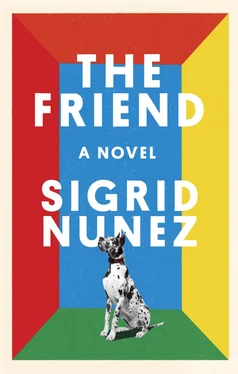I spend a lot of time on the piece, grateful for the little assignment, to be writing something, anything. I finish it and send it off, but there is no response, and I never hear from the producer again.
• • •
In the news:
An experimental therapy being practiced at some animal shelters: having volunteers read aloud to abused and traumatized dogs.
Interview with a professional dancer who, as a young boy, a victim of persistent bullying, went mute.
Death of author Michael Herr. Whose obituary reveals that in the last years of his life he had become a devout Buddhist, and stopped writing.
• • •
From The Oxford Book of Death :
Nabokov’s syllogism. Other men die; but I am not another; therefore I’ll not die.
“The one experience I shall never describe,” I said to Vita yesterday , journaled Virginia Woolf. Fifteen years before the undescribable took place.
• • •
In writing workshops, many stories begin with someone getting up in the morning. Much less often does a story end with someone going to bed. More likely a story will end with a death. In fact, many student stories either begin or end at a funeral. And when a student wants to convey a character’s stream of thoughts, they almost always set the character in motion. They put him or her into some kind of transportation, usually a car or a plane. As if they could only imagine someone thinking if that person is also moving through space.
Q. Why did you send this character on a trip to India when that has nothing to do with the rest of the story?
A. I wanted to show him worrying a lot.
• • •
Last words. So this is how the story ends , my friend in the AIDS hospice said. Eyes wide with wonder, like a child’s.
How should the story end? For some time now I have imagined it ending like this.
A woman alone in her apartment one morning, getting ready to go out. One of those early spring days with equal periods of sun and clouds. Chance of a shower, late. The woman has been awake since first light.
What time is it now?
Eight o’clock.
What did the woman do between the time she woke up and eight?
For about half an hour she lay in bed trying to fall back to sleep.
Does the woman suffer from that particular kind of insomnia: frequent waking, inability to stay asleep?
Yes.
Is there some little trick she tries when this happens to get back to sleep?
Counting backward from a thousand. Naming, in alphabetical order, all the states. This morning, though, neither worked.
So she got up. And then—?
Made coffee. One espresso brewed in a single-cup moka pot that she acquired only recently and that she has found she likes better than the French press she’d been using before and that about a month ago she accidentally broke. In general, she enjoys this morning ritual. Brewing and drinking the coffee while listening to the news on the radio.
What news did the woman hear?
In fact, this morning she is preoccupied and hasn’t really been listening.
Did she eat anything?
Half a banana sliced into a cup of plain yogurt mixed with some raisins and walnuts.
What did she do after breakfast?
Checked email. Responded to one message, an inquiry from the college bookstore about some books she’d ordered for a course. Confirmed a dentist appointment. Took a shower and began to get dressed. But she keeps wavering because of the kind of day it is. Will a sweater be too warm? Will her raincoat be too light? Should she take an umbrella? What about a hat? Gloves?
Where is the woman off to this morning?
To visit an old friend who’s been in the hospital.
What does she finally decide to wear?
Jeans and a cardigan over a turtleneck. Her hooded raincoat.
How does the woman get to her friend’s house?
She takes the subway from Manhattan to Brooklyn.
Does she stop anywhere on the way?
At a florist near the train station in Manhattan, where she buys some daffodils.
And when she gets off at her stop, does she go straight to her friend’s house?
Yes. See her now approaching his brownstone.
Does the friend she is visiting also live alone?
No, he lives with his wife. Who isn’t home this morning because she’s at work. But there’s a dog. Hear him bark at the sound of the doorbell. The door opens and the man steps out, greeting the woman with a hug. The man is dressed—by coincidence—just as she is under her raincoat: blue jeans, black turtleneck, gray cardigan. They hold each other tightly for a few moments as the dog, a miniature dachshund, barks and leaps at them.
Now they are settled in the living room, drinking the tea the man has made for them. A small plate holding a few shortbread cookies remains untouched. The daffodils have been placed in a small crystal vase in a sunny spot on the windowsill where they glow with a neon brightness that (the woman can’t help thinking) makes them look fake. One of the stems has bent, and the flower hangs down as if ashamed, or shy of the spotlight.
Now it can be seen that the man has the paleness and gauntness of a convalescent. His voice is strained, as if it’s an effort to speak above a whisper. There is stress in the air as of something about to burst or break. The dog senses this and for that reason is unable to relax, though he lies very still in his wicker basket. The man speaks, and the dog, hearing his name, beats his tail.
“I wanted to thank you again for taking care of Jip.”
“Oh, he was no trouble,” says the woman. “I liked having him. It was like having a furry bit of you there.”
“Ha,” goes the man, and the woman says, “I was just glad to be able to help.”
“And you were a big help,” the man assures her. “Jip’s a good boy, but he’s spoiled and needs a lot of attention. And my poor wife had enough to deal with.” A pause. The man lowers his voice. “By the way, I meant to ask, what exactly did she tell you?”
“That she was on a business trip and her flight was delayed because of a storm in Denver. That she tried calling you from the airport but there was no answer. Then the flight was canceled and she took a cab home, and when she got there she saw the note to the cleaning lady warning her not to come in. And to call 911.”
The man does not look at the woman as she speaks. He stares at the daffodils on the windowsill, squinting as if their brightness hurts his eyes. When she stops speaking he waits, as if expecting more, and when there is no more he says, “If a student put that in a story I’d say, That’s too easy.”
At that moment a cloud blots the sun and the room darkens. The woman has a surge of panic, alarmed at the stinging threat of tears.
“I had it all worked out,” the man says. “I’d taken Jip to the kennel. The cleaning lady was scheduled to come the next morning.”
“But how are you now?” asks the woman a bit too loudly, making the dog startle. “How do you feel?”
“Disgraced.”
The woman starts to protest but the man cuts her off. “It’s true. I feel humiliated. But that’s a common response.”
I know, the woman doesn’t say. I’ve been reading up on suicide.
“But that’s not all I feel,” the man says, lifting his chin. “Turns out I’m nothing special. I’m like most failed suicides: happy to have survived.”
At a loss the woman says, “Well, that’s good to hear!”
“I keep wondering, though, why I don’t feel more ,” the man goes on. “A lot of the time I feel hazy, or numb, like it all happened fifty years ago—or never even at all. But that’s partly the medication.”
Читать дальше












